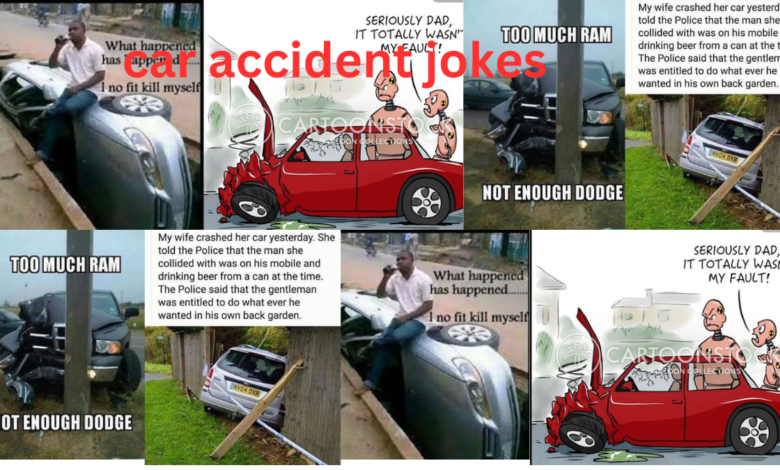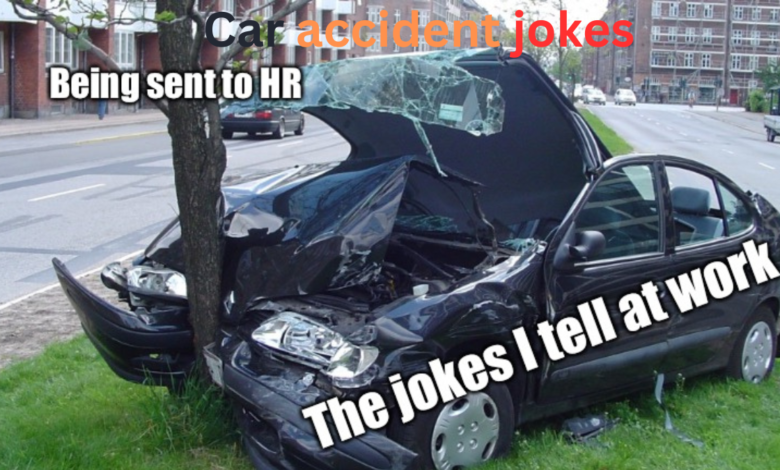Car Accident Jokes: Navigating Humor in Sensitive Situations

Introduction: The Complexity of Humor in Dark Situations
Humor has long been a way for people to cope with difficult and uncomfortable situations. Car accident jokes, often considered a type of “dark humor,” sit at the intersection of sensitive subject matter and the cathartic release that laughter provides. While some might see these jokes as inappropriate or offensive, others view them as a way to deal with trauma or simply poke fun at life’s unpredictability. In this article, we’ll explore the dynamics of car accident jokes, why they exist, and the potential social and emotional impact they can have.
What Are Car Accident Jokes?
Defining Dark Humor

Before diving into the specifics of car accident jokes, it’s essential to understand dark humor as a broader concept. Dark humor, sometimes called gallows humor, is a form of comedy that deals with serious, painful, or morbid topics in a way that finds humor in tragedy. While some might shy away from these jokes, others believe they provide a coping mechanism for confronting uncomfortable realities.
Dark humor allows people to laugh in the face of adversity, whether it’s death, accidents, or personal failure. In the context of car accidents, the humor often lies in the absurdity of life’s unpredictability or how people respond to misfortune.
Car Accidents as a Subject of Humor
Car accident jokes are one of the most common causes of trauma in modern life, which makes them a frequent subject of dark humor. In many cases, the jokes aren’t about the severity of the accident itself but rather the peculiar, ironic, or ridiculous circumstances surrounding it. The humor comes from turning something serious and often tragic into something lighthearted.
For instance, a car accident jokes about someone crashing their car while distracted by a clown crossing the street brings together elements of surprise, absurdity, and dark humor. The idea isn’t to make light of the actual pain caused by accidents but to create a humorous narrative out of an otherwise unfortunate event.
The Appeal of Car Accident Jokes
Coping Mechanism for Trauma
One of the key reasons people turn to car accident jokes is as a means of coping with trauma. Whether someone has been in an accident themselves or knows someone who has, humor can help alleviate the emotional weight of the situation. By laughing at what could have been a life-threatening or deeply distressing event, people find a way to release tension and reclaim a sense of control.
Psychologically, humor has been shown to activate the brain’s reward system, releasing endorphins that counteract feelings of anxiety or stress. This is why, in moments of crisis or after experiencing trauma, some individuals naturally resort to humor as a defense mechanism. In a way, laughing at a car accident, particularly one with a minor outcome, can help neutralize the fear and anxiety associated with it.
Finding Humor in the Absurd
Humans are drawn to humor that highlights the absurdity of life. Car accident jokes often focus on the bizarre situations that occur right before or after an accident. For example, the idea that someone could rear-end a car because they were too busy eating a sandwich while driving is ridiculous and humorous because it’s a mistake that most people can relate to or imagine happening.
This absurdity appeals to our sense of humor because it highlights the often irrational or unpredictable nature of human behavior. Even in situations as serious as a car accident, people do things that defy logic, and pointing this out through humor can create a shared experience of laughing at life’s strangeness.
Social Bonding Through Humor
Humor is a universal language that helps people bond and connect. When it comes to car accident jokes, especially among friends or family members who have experienced accidents, these car accident jokes can become a way of lightening the mood and creating camaraderie. Sharing a laugh about an unfortunate event—especially one that everyone walked away from—can strengthen relationships and reduce feelings of isolation.
For example, a person might joke about their car getting hit at a stoplight by someone who was texting. While this situation is serious, laughing about it later can make the experience seem less overwhelming and more manageable. When shared in a group, these jokes can become an inside reference, creating a sense of closeness among those who experienced or witnessed the event.
The Fine Line Between Humor and Insensitivity
When Car Accident Jokes Cross the Line
While humor can be therapeutic, it’s essential to recognize that not everyone will appreciate jokes about serious topics like car accidents. For many, car accidents have devastating consequences, involving injury or even loss of life, and jokes about such experiences can come across as insensitive or hurtful. The challenge with car accident jokes is knowing when and where it’s appropriate to share them.
For instance, making light of a fender bender might be fine among friends who experienced the incident together, but joking about a fatal accident in a public setting could easily offend those who have suffered real trauma. It’s all about context, tone, and timing.
In particular, jokes that trivialize the pain of others or make light of someone else’s suffering are likely to be seen as cruel. For example, saying something like, “Well, at least you totaled the car and not yourself,” in the wrong context could be interpreted as dismissive or callous. This kind of humor can hurt people who are still grappling with the emotional or physical aftermath of an accident.
Recognizing the Audience
Understanding the audience is crucial when it comes to car accident jokes. Among friends who share a similar sense of humor, these jokes might be acceptable, but in more formal or public settings, it’s best to tread carefully. What one person finds hilarious, another might find deeply offensive, especially if they’ve had a traumatic experience with a car accident.
In social situations, it’s important to gauge how people respond to humor before launching into jokes that might touch on sensitive topics. If there’s any doubt about how well a car accident joke will be received, it’s usually safer to avoid making the joke altogether.
The Role of Empathy in Humor
Empathy plays a significant role in humor, especially when it involves dark topics like car accidents. Jokes that come from a place of shared experience or mutual understanding are often more palatable because they demonstrate empathy toward the subject. However, jokes that seem detached or indifferent to the suffering involved are more likely to offend.
For example, someone who has been in a minor car accident might find it therapeutic to joke about the ridiculousness of the situation with friends who have had similar experiences. But someone who hasn’t been in an accident might come across as uncaring if they make jokes about accidents in front of someone still recovering from one. Empathy and understanding are key factors in determining whether humor will land appropriately.
Examples of Car Accident Jokes: Finding the Balance
Lighthearted and Absurd Jokes
- “I got into a car accident while trying to parallel park. At least the car behind me can now say I was so bad at parking, I hit a stationary object.”
- This joke plays on the relatable challenge of parallel parking and the absurdity of causing an accident during such a mundane activity. The humor is light and focuses on the silliness of the situation rather than the severity of the accident.
- “My car accident taught me one thing—cars don’t like being rear-ended any more than we do!”
- Here, the joke anthropomorphizes the car, attributing human feelings to it in a humorous way. The humor remains light without minimizing the reality of the accident.
- “Why did the driver cross the road? Apparently to crash into my car!”
- This joke takes a familiar structure and adds a twist related to car accidents. It’s simple, silly, and focuses on the absurdity of accidents happening at the worst possible moments.
Edgy or Dark Jokes
- “Had a fender bender today. Now my car matches my emotional state—totally wrecked.”
- This joke leans into dark humor, using the accident as a metaphor for emotional turmoil. It’s self-deprecating and appeals to those who appreciate a more cynical or dark comedic tone.
- “Got into a car accident because I was texting. On the bright side, my car’s a real conversation starter now.”
- This joke is edgier because it references a serious cause of accidents—texting while driving. However, it maintains a humorous tone by focusing on the aftermath in a lighthearted way.
- “I told my insurance company I got into a car accident, and they said, ‘Was it your fault?’ I said, ‘Well, I didn’t hit the other car on purpose!'”
- This joke works because it plays on the natural tension that arises in conversations with insurance companies after an accident. It pokes fun at the process without making light of the accident’s consequences.
Navigating Humor in Public Discourse
Humor on Social Media
Social media platforms have become breeding grounds for humor, including car accident jokes. However, the anonymity and distance provided by online platforms can make it harder to gauge whether certain jokes will be well-received. Online, car accident jokes can range from lighthearted memes to much darker forms of humor.
One of the challenges with humor on social media is that it’s easy for jokes to be taken out of context. What might be funny to a close-knit group of friends can be perceived very differently when shared with a broader audience. Car accident jokes, in particular, can quickly spiral into controversy if not carefully crafted or if they seem to mock serious situations.
Memes and the Absurdity of Everyday Accidents
Memes have become a popular way to deliver jokes about all sorts of situations, including car accidents. Many car accident memes focus on the frustration of dealing with insurance companies, the chaos of traffic, or the absurdity of minor accidents. These memes tend to work well because they often strike a balance between relatability and humor, allowing people to laugh at shared experiences without crossing into offense.

